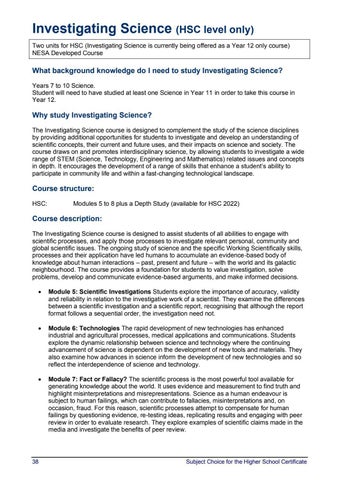Investigating Science (HSC level only) Two units for HSC (Investigating Science is currently being offered as a Year 12 only course) NESA Developed Course
What background knowledge do I need to study Investigating Science? Years 7 to 10 Science. Student will need to have studied at least one Science in Year 11 in order to take this course in Year 12.
Why study Investigating Science? The Investigating Science course is designed to complement the study of the science disciplines by providing additional opportunities for students to investigate and develop an understanding of scientific concepts, their current and future uses, and their impacts on science and society. The course draws on and promotes interdisciplinary science, by allowing students to investigate a wide range of STEM (Science, Technology, Engineering and Mathematics) related issues and concepts in depth. It encourages the development of a range of skills that enhance a student’s ability to participate in community life and within a fast-changing technological landscape.
Course structure: HSC:
Modules 5 to 8 plus a Depth Study (available for HSC 2022)
Course description: The Investigating Science course is designed to assist students of all abilities to engage with scientific processes, and apply those processes to investigate relevant personal, community and global scientific issues. The ongoing study of science and the specific Working Scientifically skills, processes and their application have led humans to accumulate an evidence-based body of knowledge about human interactions – past, present and future – with the world and its galactic neighbourhood. The course provides a foundation for students to value investigation, solve problems, develop and communicate evidence-based arguments, and make informed decisions. •
Module 5: Scientific Investigations Students explore the importance of accuracy, validity and reliability in relation to the investigative work of a scientist. They examine the differences between a scientific investigation and a scientific report, recognising that although the report format follows a sequential order, the investigation need not.
•
Module 6: Technologies The rapid development of new technologies has enhanced industrial and agricultural processes, medical applications and communications. Students explore the dynamic relationship between science and technology where the continuing advancement of science is dependent on the development of new tools and materials. They also examine how advances in science inform the development of new technologies and so reflect the interdependence of science and technology.
•
Module 7: Fact or Fallacy? The scientific process is the most powerful tool available for generating knowledge about the world. It uses evidence and measurement to find truth and highlight misinterpretations and misrepresentations. Science as a human endeavour is subject to human failings, which can contribute to fallacies, misinterpretations and, on occasion, fraud. For this reason, scientific processes attempt to compensate for human failings by questioning evidence, re-testing ideas, replicating results and engaging with peer review in order to evaluate research. They explore examples of scientific claims made in the media and investigate the benefits of peer review.
38
Subject Choice for the Higher School Certificate




